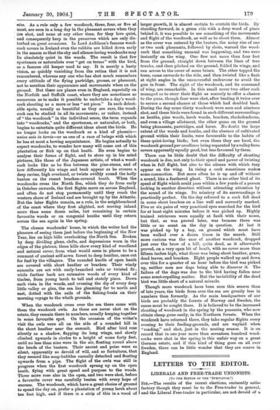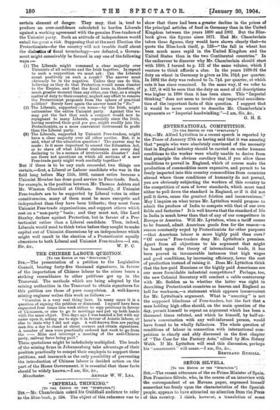LETTERS TO THE EDITOR.
LIBERALS AND FREE-TRADE UNIONISTS.
[To TM/ EDITOR OF THE "SP2CTATOR.1 Sin,—The results of the recent elections, eminently satis-- factory though they must be to the Free-trader in general, and the Liberal Free-trader in particular, are not devoid of a certain element of danger. They may,' that is, tend to produce an over-confidence calculated to' harden Liberals against a working agreement with the genuine Free-traders of the Unionist party. Such an attitude of independence would entail too great a risk. Supposing that at the next Election the Protectionists—for the country will not trouble itself, about the dialestica of fiscal terminology—are defeated, a Government:might conceivably be formed in any one of the following
ways :—
(1) The Liberals might command a clear majority over Unionists of all sections and the Irish together. In regard
to such a supposition We must ask: Can the Liberals count positively on such rik result ? The answer must obviously be in the negative. Unless they can do this, believing as they do that Protection would mean disaster to the Empire, and. that the fiscal issue is, therefore, of much greater momentthan any other, can they, as a simple matter of duty,to their country, neglect any effort to remove the Protectionist proposals from the sphere of practical politics ? Surely here again the answer must be "No." (2) The Liberals, supported—on terms—by the Irish; might outnumber the entire Unionist party. Against this we may, put the fact that such a compact would now be repugnant to many Liberals, especially since the Irish, • having received their quid pro quo, might readily join the Protectionists, as a more convenient instrument to profit than the Liberal party.
(8) The Liberals, supported by Unionist Free-traders, might have a clear majority over all other parties. But, it is said, what of the education question? The answer may be made: Is it more important to amend the Education Act, or to stave off what Liberal statesmen . are every day declaring to be a. menace of irretrievable disaster ? And are there not questions on which all sections of a new Free-trade party might work cordially together ?
But if there is to be any such concordat, two things are nertain,=first, a Liberal or Labour candidate who was in the field long before May 15th, 1903, cannot retire because a Unionist Member has done good service to Free-trade. Such, for example, is the position between Mr. Thomas Ashton and Mr. Winston Churchill at Oldham. Secondly, if Unionist Free-tradefs are -to be supported by Liberal votes in other constituencies, many of them must be- more energetic and independent than they have been hitherto; they must form Unionist Free-trad.e organisations, and support others which
rest on a " non-party " basis; and they must not, like Lord Stanley, declare against Protection, but in favour of a Pro- teCtioniet 'rather than a Liberal candidate. • Then, indeed, Liberals would need to think twice before they sought to make
capital out- of Unionist dissensions by an independence which might well result' in: the election of a Protectionist equally obnoxious to both Liberal and Unionist Free-traders.—I am,























































 Previous page
Previous page